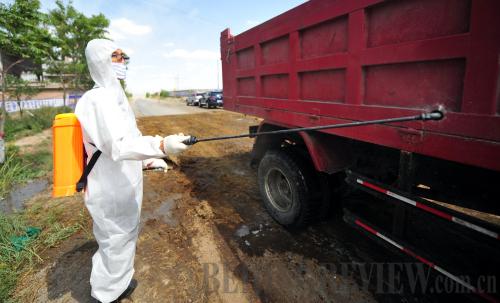|
 |
|
RAPID RESPONSE: A disease control worker sterilizes a vehicle on its way out of Luyang Township, Jingtai County, northwest China's Gansu Province, on June 7, 2012, immediately after an outbreak of avian flu was confirmed (ZHANG MENG) |
On January 23, 2002 the Ministry of Health founded the Chinese Center for Disease Control and Prevention (CDC) as an effort to monitor and control the spread of major diseases. In the same year, the nascent organization was overwhelmed by a major outbreak that it was simply too inexperienced to handle.
In November 2002, the first known case of severe acute respiratory syndrome (SARS) was reported in south China's Guangdong Province, and the viral outbreak quickly spread elsewhere in the country as well as to some other countries and regions.
"When the outbreak of SARS occurred, the formation of the CDC was still underway as it had combined four smaller departments. Back then, the concept of disease control was novel to the public and local anti-epidemic agencies had yet to be in place," recalled Li Liming, founding director of the CDC.
Ten years later, Li said that SARS arrived too early and caught the fledgling organization by surprise. "Only if I was given three more years to prepare our working system for an epidemic of such scale, we could have handled it much better," Li said.
During China's early fight against the SARS outbreak, the CDC's priority was to identify the cause. Over time, there was a major shift of policy in putting the CDC in charge of curbing transmission, said Zeng Guang, 67, chief CDC epidemiologist.
Although the SARS epidemic exerted heavy tolls on China's health and economy, the virus was effectively contained. On August 16, 2003 the Ministry of Health announced that a total of 5,327 SARS cases were reported on the Chinese mainland and the death toll stood at 349.
At the opening meeting of this year's full session of the National People's Congress (NPC), China's top legislature, on March 5, Premier Wen Jiabao said, "An important lesson we learned in our response to the sudden outbreak of SARS in 2003 is that economic development and social development need to be coordinated."
"China had a lot of landmark events happening during the last decade while SARS is the only disease singled out in the government work report," said Wang Yu, current director of the CDC. "It showed that the leadership learned an unforgettable lesson from SARS in terms of upgrading guiding principles of governance and social development models, which will have long-term impacts on China's development."
|
